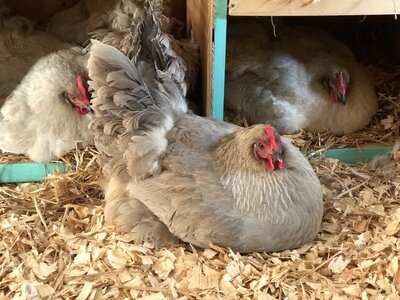Hartsharvestfarms
In the Brooder
- Mar 21, 2020
- 43
- 55
- 33
I’m new at this!! I have had my Lavender Orpington flock for a year and a month and we have had a very humid, wet summer in WNC. I’m really needing some experience/strength/hope on preventing/treating my birds for worms and parasites. Which ones? I have no idea, but I’m going to say ALL of them. I would really like to go the natural route and avoid having any harsh chemicals on my property if possible, I’m not entirely opposed for extreme situations, but want to start off without it.
So background info:
7 hens, 1 Roo 1 year old
12 older chicks
large cement floor coop (8x12) with drywall, it’s actually a room off the basement with a separate entrance. There are two windows in the coop that do not open. We liked this feature for the winter, but it does not offer enough ventilation for the heat of summer. We definitely have a fly problem right now.
My birds free range
They are fed a blend I make of cracked corn, black sunflower seeds, oats and DE. They also forage and get lots of kitchen scraps.
pine shavings over the cement floors, but the chickens all have roosts they sleep on.
many thoughts, ideas or experiences are greatly appreciated!
So background info:
7 hens, 1 Roo 1 year old
12 older chicks
large cement floor coop (8x12) with drywall, it’s actually a room off the basement with a separate entrance. There are two windows in the coop that do not open. We liked this feature for the winter, but it does not offer enough ventilation for the heat of summer. We definitely have a fly problem right now.
My birds free range
They are fed a blend I make of cracked corn, black sunflower seeds, oats and DE. They also forage and get lots of kitchen scraps.
pine shavings over the cement floors, but the chickens all have roosts they sleep on.
many thoughts, ideas or experiences are greatly appreciated!







